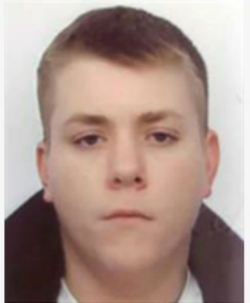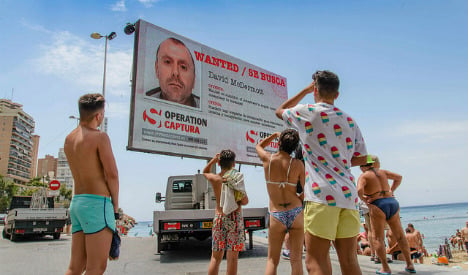Police detained Michael Roden, also known by his nickname “Dodge”, and six other suspects earlier this month in the southwestern province of Granada, a police spokesman said on Monday.
Roden, a suspected member of an organised crime group, is wanted by British police in connection with the importation of 70 kilos (155 pounds) of cannabis into Britain from Spain in 2013.

Photo: Crimestoppers
He was convicted in October 2010 in Britain of large-scale production of cannabis and jailed for three years.
Roden, who is originally from Redditch, Worcestershire was released early the following year but failed to meet his probation conditions and is wanted for recall into prison.
He is on a list of Britain's ten most wanted fugitives put together by Crimestoppers, a police-backed British charity that appeals for help in solving crimes.
Spanish police detained Roden and the six other suspects – three men and three women – between October 4th and 11th as part of a probe into an organisation suspected of smuggling marijuana into several European Union nations, mainly Britain.
“The drugs, which was of a high quality and vacuum packed, was transported using different types of vehicles, such as campers, trucks, high-powered cars,” police said in a statement.
Police charged Roden and the six other suspects with membership in a criminal organisation, drug trafficking, money laundering, illegal arms possession and document falsification.
Police seized 30 kilos of marijuana as part of their operations as well as several guns and cars and over €85,000 ($91,500) in cash.
An estimated one million British nationals live in Spain all or part of the year, according to the British embassy.
Spain's southern Costa del Sol – once dubbed the “Costa del Crime” – has been known as a hideaway for British criminals in the past, especially in the late 1970s and 80s when there were no extradition agreements with Britain.
But the situation changed in 2004 with European arrest warrants, making it easier to bring British criminals back to face justice.
The latest arrest means that 73 out of 86 so far named on the Captura list have been detained.
Dave Allen, Head of the International Crime Bureau at the National Crime Agency, said:
“The arrest of Michael Roden marks yet another success for Operation Captura and highlights the effectiveness of the campaign in flushing out fugitives.
“We’ve caught 73 out of 86 fugitives on the Captura list and will continue to work closely with our law enforcement partners to find the remaining 13.”
Lord Ashcroft, KCMG PC, Founder and Chair of Crimestoppers, said: “The success of Operation Captura has been quite incredible and I commend all those at Crimestoppers, the NCA and the Spanish authorities for their tireless work in locating these wanted individuals.
“We are now down to the unlucky 13 who still remain at large, and I would ask anyone with information on their whereabouts to contact Crimestoppers anonymously on 900 555 111 in Spain or 0800 555 111 in the UK, so we can bring them to justice.”



 Please whitelist us to continue reading.
Please whitelist us to continue reading.
Member comments